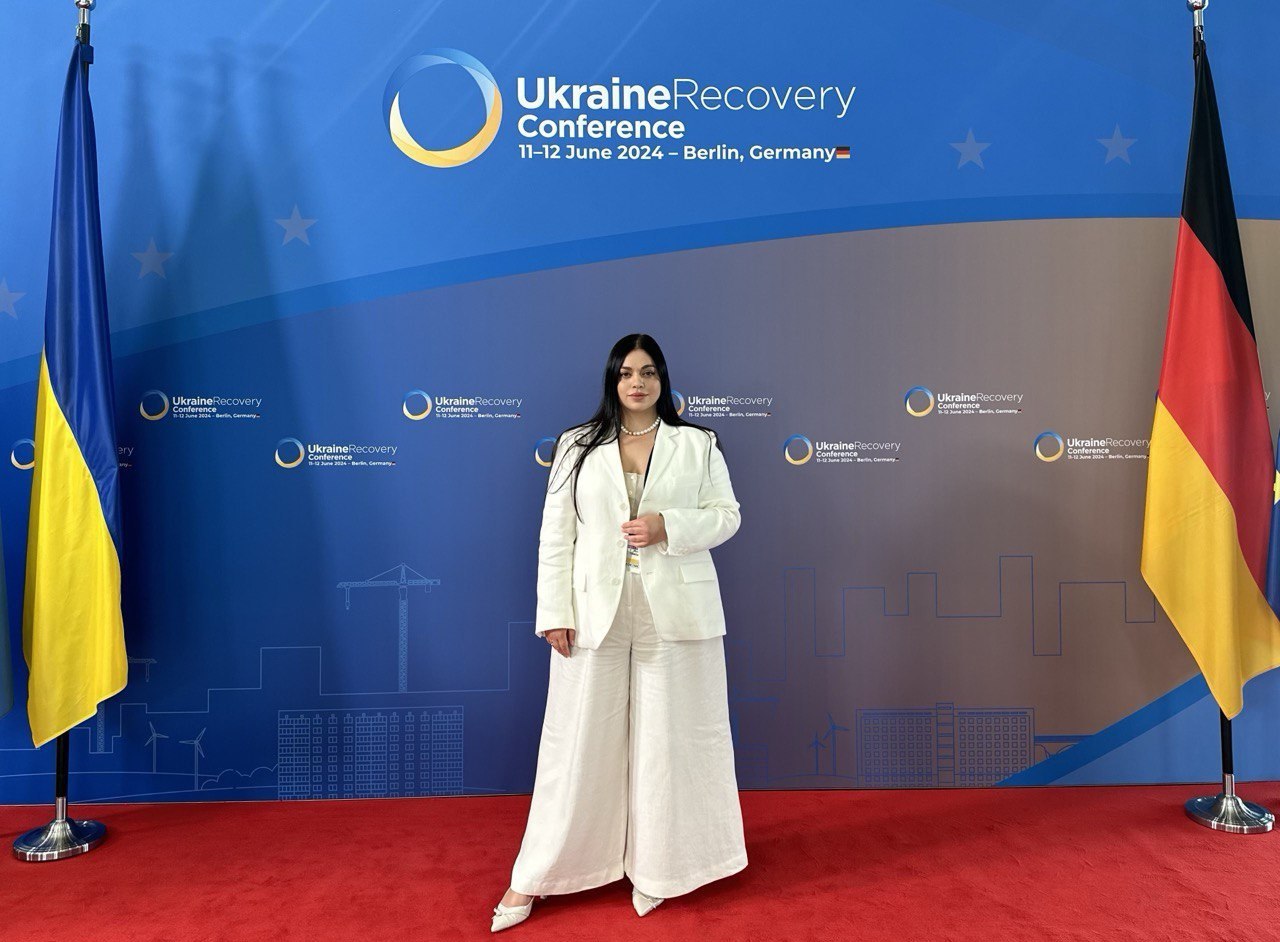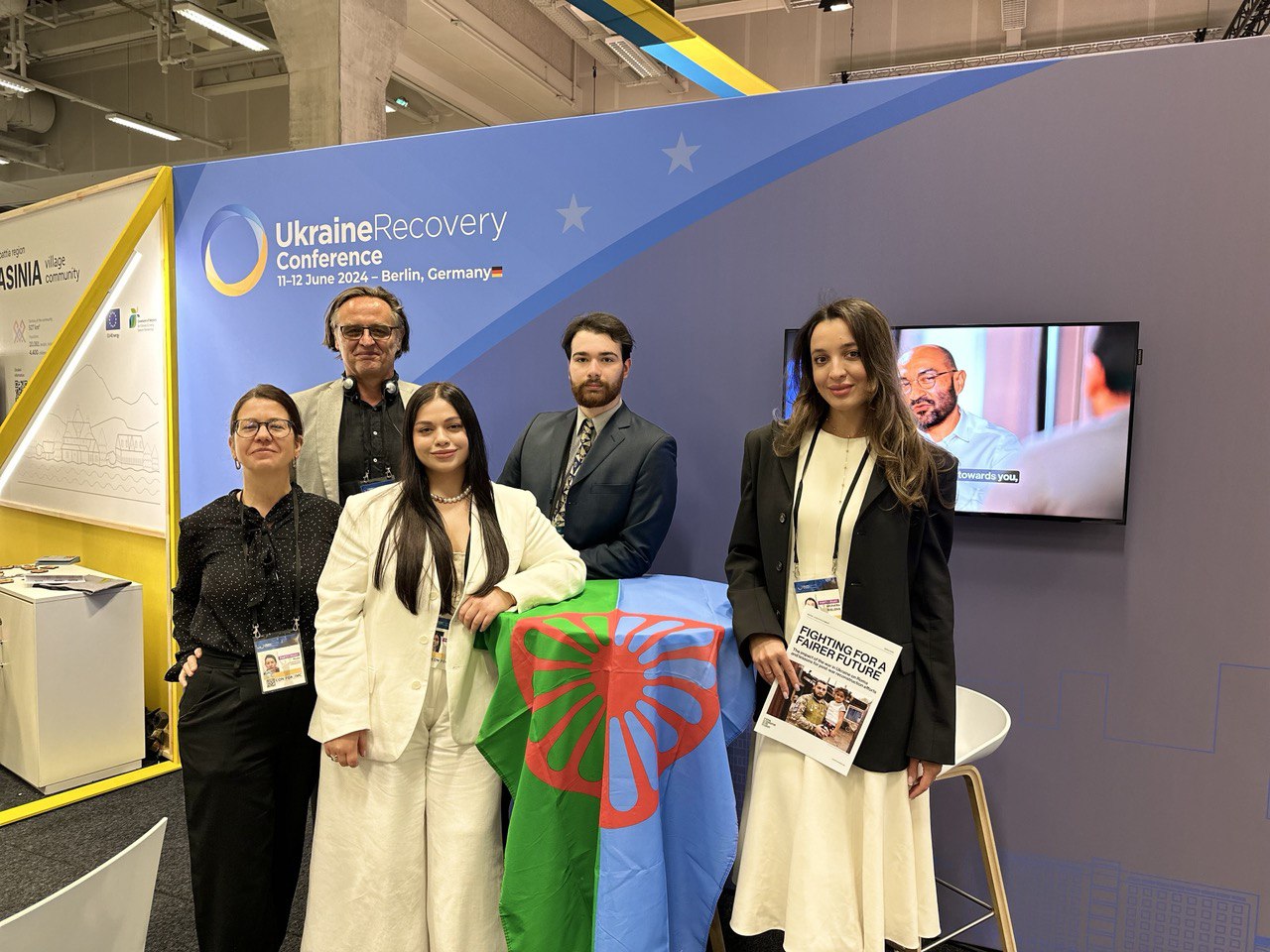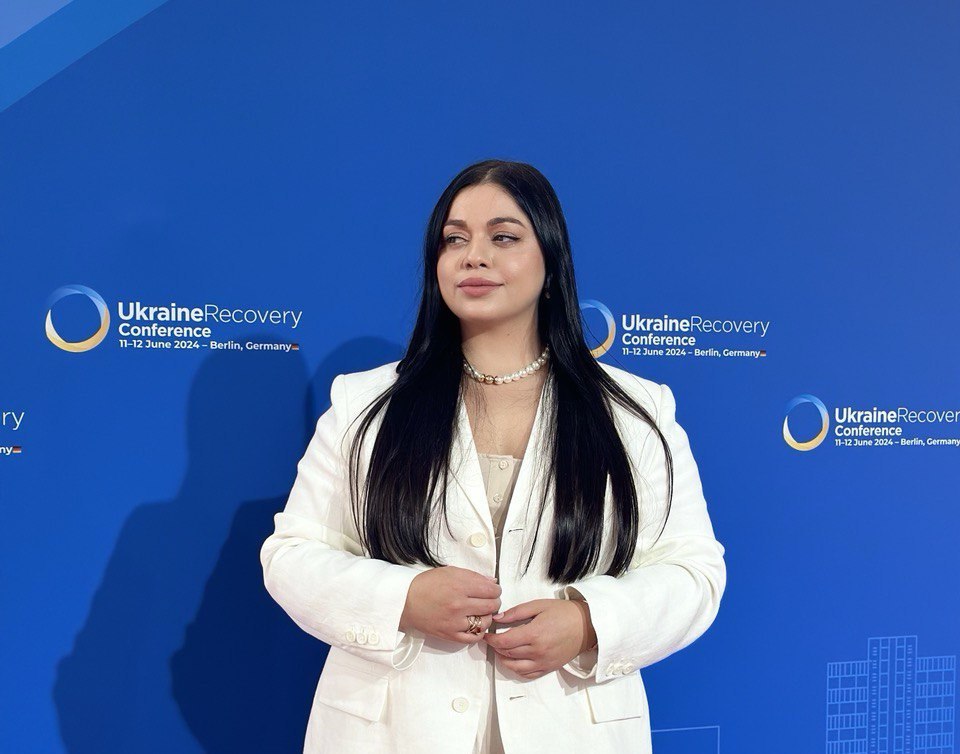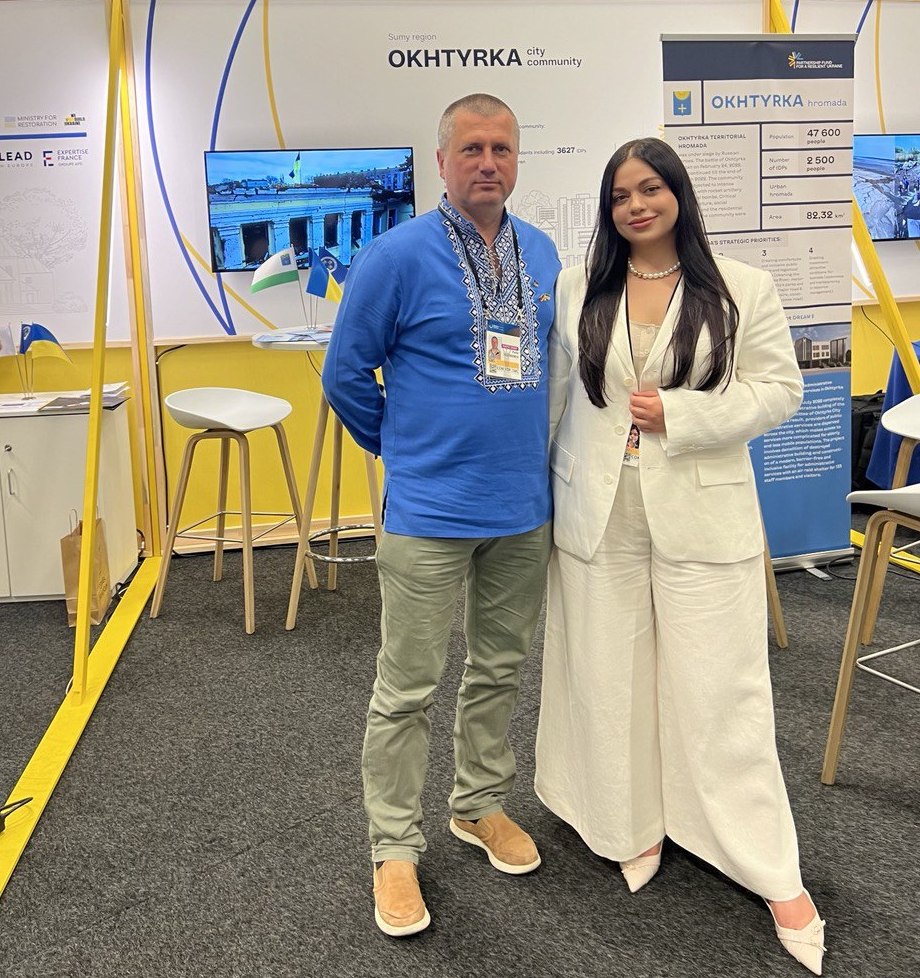Natali Tomenko: «The principal assignment of ARСA is to preserve the Romani cultural heritage
Preservation of cultural values during the Russian war against Ukraine was the topic discussed within the recently conducted International Conference for the Reconstruction of Ukraine in Berlin. The event was attended by the Romani organisations that are working in Ukraine, protecting their rights, and preserving their cultural heritage. Svitlana Mialyk has talked to Natali Tomenko, Deputy Director of ARKA Youth Agency for the Advocacy of Romani Culture who has taken part in the Berlin Conference.

Photo: Natali Tomenko, Deputy Director of ARСA Youth Agency for the Advocacy of Romani Culture
– Natali, on the 11th and the 12th of June this year, Germany and Ukraine have held a joint conference in Berlin, focusing on the matters of restoration of Ukraine. Over two thousand participants from over 60 countries and a multitude of NGOs teamed up to discuss how would it be possible to enhance the support of Ukraine on its way towards reconstruction, both during the ongoing war and afterwards. ARСA Youth Agency for the Advocacy of Romani Culture has also taken part in this Berlin Conference. Do you think you could tell us about the primary message you brought to the Conference?
– The primary message pertained to the fact that Romanis are an integral part of the Ukrainian society. There were several representatives from Romani organisations and each and every one of us spoke on how Romanis contribute to the Ukrainian society, how important they were on the way to the modern-day Ukraine, and how they constitute an integral part on the way towards free Europe and independent Ukraine.
– As far as I know, apart from ARСA, your colleagues from other NGOs were also present?
– Yes, there were five Romani NGOs attending, three of them from Ukraine. That was «ARСA», there was also «Chirikli Romani Women’s Fund», and there was also the «Voice of Romni» NGO. Plus, our partners, the international organisations: «Central Council of German Roma and Sinti» and the «Romani Fund for Europe».
– Do your objectives and priorities concur with the objectives and priorities of other Romani NGOs? I mean Ukrainian NGOs and foreign NGOs?
– Yes, of course, our visions on how the situation in Ukraine and abroad can improve are very much alike. And the society in general ought to get to work, too, and ought to consider the contribution we are making in order for there to be less discrimination around the world, in order for there to be less aggression and violence aimed at Romanis, at other ethnic groups, and in general, in order for the world to become a better place.

Photo (left to right): bottom row: Neda Korunovska, Romani Fund for Europe; Natali Tomenko, Deputy Director of ARСA Youth Agency for the Advocacy of Romani Culture; top row: Stefan Müller, Central Council of German Roma and Sinti; Daniel Khromyko, Chirikli NGO, Anzhelika Bielova, Voice of Romni NGO
«Today’s young artists are witnesses of the war and the manner in which they present their vision on a medium is something that will remain part of history, as a reflection. Something that is very important to preserve, too», – says Natali Tomenko
– What about the cultural component? How important was it during the conference on the Reconstruction of Ukraine in Berlin? As far as I have heard, the primary focus was on matters of finance, investment, the material, tangible things, so to say. At the same time, we are aware of how important the cultural, the historical component is in the process of rebuilding the country. Please tell us what your vision is on how situation looked like during the Berlin Conference, and how important was the cultural component?
– This year, the conference covered four main aspects. The first component was the human capital; the second one was the business components; the third one was Ukraine’s preparation to access the EU. There were also certain other pressing economic matters. As far as the cultural element is concerned, it was part of the human capital aspect, of this particular part of the conference, panel discussions dedicated to human capital, by and large. The topic of human capital is more about the people and more about how can society become better in the course of rebuilding of Ukraine. What can Ukrainian society and the global community do and what should they do in order for the situation to become better.
As far as the cultural component is concerned, this year’s conference included one panel discussion, focusing on the matter of protection of cultural heritage. Given the fact that this is mostly my area of expertise, as I am an expert on cultural heritage, I was very much interested in which pressing matters will there be on the agenda. And what I have seen this year gives me a lot of hope that next year, there will be a conference in Italy, in Rome, a conference on the reconstruction of Ukraine. And it is precisely in Rome that there will be a great focus on culture. Whereas this year’s conference in Berlin only contained an announcement of what will be accomplished.
There was a large conference in Vilnius, Lithuania. Before this Berlin Conference on Ukrainian Reconstruction, there was a conference in Lithuania where we discussed how much money will be given to Ukraine to protect cultural heritage and what exactly should be preserved. We, of course, focused on buildings, cultural institutions, museums, cultural objects, but another most important aspect was contemporary art and how important it was to preserve it. After all, today’s young artists are witnesses of the war and the manner in which they present their vision on a medium is something that will remain part of history, as a reflection. Something that is very important to preserve, too.
– As we compare Ukraine, Europe, and the rest of the world, how do Romani activists and Romani NGOs (I mean ARСA, first and foremost) care about the preservation of this cultural component? I mean, are you holding any other events, like the once that have taken place? If so, could you name a few that are currently being planned? We are not going to discuss the Romani genocide. But before that, I would like to discuss cultural events which you are organising to shed light upon Romani history and culture
– The primary focus of our organisation is to preserve the Romani cultural heritage. We have been working in this area for over five years now. We have held a number of events, cultural festivals, events focusing on the preservation of memory about Romani genocide. Every year, we bring young people together to conduct an informal education and training courses for Ukrainian and Romani youth. We make sure there is this cultural dialogue between the two of them; we tell them how important it is to preserve memory about our ancestors—something that should be preserved.
It is precisely now, during the war, that it is most important to preserve culture, as many people should have left Ukraine. People can assimilate, culture may fall into decay. Another interesting factor is that Ukrainian and Romani cultures are very much related and it is quite interesting to research it. As far as our events are concerned, on the 16th of May this year in Berlin, we held an event dedicated to the Day of Romani Resistance, entitled «Romanis as a part of the Ukrainian society. Fighters for Democracy and Freedom of Conscience». And it is there that we presented an exhibition of Oleksandr Maksymov, a Ukrainian artist who depicted his Romani heroes in his collages. He called them heroes: the Romani activists from Ukrainian history as well as today’s activists from various realms of human activity, including fighters and health care professionals. Our Romanis, who are now in the Ukrainian Armed Forces, fighting for the freedom of Ukraine.
And so, there was this exhibition that attracted the attention of many people; there was a screening of a film about the history of Romanis, about today’s history of Romanis, so intertwined with the history of the Second World War, with today’s war. I mean, we are nowadays holding a lot of events—and the main event is scheduled for this year’s summer, focused on this very topic which you have already mentioned: the Romani Genocide.
«Rashism and fascism are very much alike; there are a lot of parallels. Everything we see today, what they are doing, is tantamount to dehumanisation of society, the complete destruction of culture, of people, of whatever humane there is. Hence, it is very important to never forget about it and to fight for democracy», – says Natali Tomenko
– This year we will be commemorating the 80th anniversary of the events of the 2nd and 3rd of August, 1994 when Nazis liquidated the so-called Romani family camp in Auschwitz-Birkenau, a Nazi death camp situated to the Polish city of Oświęcim). Then, approximately 4,500 people were murdered: men, women, children—all of them Romani prisoners.
– We do not have the exact numbers, only very approximate ones. After all, many Romanis in Auschwitz-Birkenau might have been registered as Jews or as other oppressed minorities. This is a very important date: 80 years since this tragedy in Auschwitz-Birkenau. Many Romanis from Ukraine—Transcarpathia in particular—were deported to Auschwitz. Many of our ancestors perished there. If we are talking about the history of Ukraine in general, the Romani genocide took place within the territory of other provinces—in Central and Southern Ukraine. There, the so-called ‘genocide by bullets’ took place. That is when Romanis were gunned down in groups: whenever they were detected, they were shot on site. In Western Europe, on the other hand, such processes took place within concentration camps. That is the only difference.

Photo: Natali Tomenko, Deputy Director of ARСA Youth Agency for the Advocacy of Romani Culture
– Tell us please, Natali, why is it so important to remember those horrible times, the times of genocide? We do know that the 2nd of August is the European Day for Commemoration of the Victims of the Romani Genocide. Why is it important to remember? Why is it important for the generations of today and of tomorrow know and remember this? Because now, Ukraine is at war and we are currently witnessing a modern-day genocide aimed at Ukraine, at the Ukrainian population—and also at Romanis who, too, are part of Ukraine. I mean, why is it important to remember those times?
– Well, you know, after the Second World War, after all those horrors of genocide, after people of so many ethnicities perished, including Ukrainians—do you know how many mottos there were, proclaiming, declaring, undertaking, promising: «Never Again»? And how horrible it is that today, this «Never Again» happened again. That is, we are going through very difficult times today.
There are plenty of Romani witnesses of the Second World War who are nowadays going through the second war in their lifetime. And here we are, recording their testimony. And as we hear their stories, many people say that they do not want this violence to continue existing in this world. That is why, the very preservation of the memory of those horrible times during the Second World War, about the Romani genocide, reminds us of the fact that violence does exist and that we should be fighting it—fighting this horrible dark energy and rashism which still exists, right in front of us.
Rashism and fascism are very much alike; there are a lot of parallels. Everything we see today, what they are doing, is tantamount to dehumanisation of society, the complete destruction of culture, of people, of whatever humane there is. That is why, it is most important to never forget and to always struggle for democracy.
– I have heard representatives of several Romani organisations say that the testimonies of those times help one understand how important it is to fight for Romani rights today. Because there exists a phenomenon, a challenge, present both in Ukraine and in modern-day Europe, as anti-Gypsyism. This memory of the genocide, of all those tragic pages of history, how does it help us understand the importance of Romani struggle for their rights today?
– Well, let us see. After the Second World War, the problem consisted in the fact that Romanis were excluded from the discourse itself. Today, we are organising plenty of events, exhibitions, whereby we showcase Romanis who were WW2 fighters, defending society—same as the Romanis that are defending Ukraine today. That is, having this experience after the Second World War, we understand that we cannot remain silent today. We should get up and show how active we are—just as other Ukrainians. In order to be included in the discourse, in order for this discrimination, this anti-Gypsyism—which still exists today in Ukraine and Europewide—to fade away. So that there would be less and less of this discrimination, and for this phenomenon to fade away, by and large. Because this is an enormous obstacle on our way to build a strong and united society.
And today, as we talk discrimination, we should remember that this discrimination is not only aimed at Romanis but also at other ethnicities of Ukraine. What do we do today? We closely collaborate with the Crimean Tatars of Ukraine, with the Greeks of the Azov Region, with Jews, as we discuss our history as oppressed people. All the discrimination notwithstanding, we still consider ourselves to be Ukrainians. We still want the cultural heritage of our ethnicities to be preserved under a united «Ukrainian Umbrella». This is something I talked about during our panel discussions on inclusion at the conference dedicated to the reconstruction of Ukraine.

Photo: Pavlo Kuzmenko, Mayor of Okhtyrka City. Natali Tomenko, Deputy Director of ARСA Youth Agency for the Advocacy of Romani Culture
«Our mission is to contribute to the formation of a positive image of Romani communities in the Ukrainian society, through education, mass media, history, and culture», says Natali Tomenko
– My last question today. I would like our listeners to get to know you. How was ARKA Youth Agency for the Advocacy of Romani Culture founded? What is its story? What is the primary goal of your organisation? You have told us a bit about it but please do tell us the story of yourself and your team? What do you do?
– ARСA Youth Agency for the Advocacy of Romani Culture was created back in 2018, with the aim to develop the Romani youth movement, to support and preserve the Romani history and culture and to build international dialogue in Ukraine. Our mission is to contribute to the formation of a positive image of Romani communities in the Ukrainian society, through education, mass media, history, and culture. Today, our organisation includes many young activists and international experts, as a number of young people—girls mostly—have left the country. So today, we are creating this networking framework whereby we unite our young people and develop the Ukrainian civil sector.
– What about other countries, Poland in particular? Do you have a representation there? Any of your colleagues left for Poland?
– There is a huge Romani Ukrainian community in Poland today. We have our foreign partners, too. There is a Romani organisation called «Dialogue» in Poland. Some Romani organisations are based in Kraków. There are Romani Ukrainian activists working in these organisations today. So, yes, at the beginning of the war, Romanis were leaving for Poland—same as other Ukrainians. And representatives of the Romani civil sector were the first volunteers who gave shelter to Romanis—also due to anti-Gypsyism which is something Romanis suffer from in Europe, too. After they crossed the borders, they mostly collaborated with other Romanis. If our listeners happen to be interested and wish to know more about the history of the Romani nation, you can find more information about our future events on our platforms—particularly about the event scheduled for the 2nd of August in Kraków. There will be a huge international conference which is currently being organised by our partners and which will be attended by our ARKA team. We shall represent Ukraine and tell the story of the Romanis of Ukraine. The conference will be attended by many heads of governments. There will also be a ceremony to commemorate those Romanis that fell victim to the genocide—to our ancestors. So we welcome everyone who is interested in this topic to join us and support us.
This material has been prepared by Polish Radio Ukraine
See also
- AURA: платформа для самоорганізації і захисту прав ромської спільноти за кордоном
- Ромські активісти – про новорічні та різдвяні традиції
- Репортажистка Єва Райська: «Через звичайні людські історії я хотіла показати глибші процеси».
- Новий центр підтримки ромів у Сумах: хто отримає шанс на освіту
- Письменниця Тімея Шрек: «Життя так склалося, що повертаюся до коренів».
- Танцівниця Вікторія Чорна: «Саме ромський танок допомагає людям просто вижити»
- Громадські активісти і дослідники — про ромську мову, перспективи розвитку та загрози
- Лінгвіст Михайло Ослон: «За свої мови носіям зазвичай доводиться боротися самотужки».
- Музикант Віллі Пап-молодший: «Американський джаз або ромський джаз...»
- Художник Тиберій Йонаш: «У моїх планах відкрити величезний центр у ромській громаді»